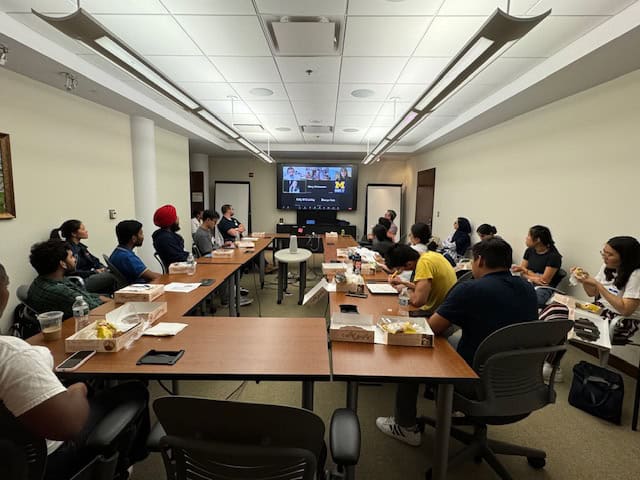
The BME Exchange – A Hub for Networking
The session featured a distinguished panel of BME alumni guest speakers who provided diverse perspectives representing the respective paths their careers have taken in the biomedical engineering profession.

The session featured a distinguished panel of BME alumni guest speakers who provided diverse perspectives representing the respective paths their careers have taken in the biomedical engineering profession.
The BME Exchange, a networking event designed to connect BME alumni, industry partners, students, postdocs, and scholars, met on July 24 at the North Campus Research Complex (NCRC). The event served as a valuable platform for attendees to interact, share knowledge, and explore career opportunities in the biomedical engineering field.
The session featured a distinguished panel of BME alumni guest speakers who provided diverse perspectives representing the respective paths their careers have taken in the biomedical engineering profession. They used highlights from their own experiences to offer general advice to the students. Speakers included:
The presenters introduced themselves, traced their professional work histories, and discussed how they made the transition from being students in an academic environment to working in different organizations. Several of them noted that the skills they acquired as U-M BME students served them well once they arrived in the workforce.
The BME Exchange not only fostered networking among participants, but also facilitated the exchange of innovative ideas, as the panelists offered tips and suggestions for current students as they contemplate their own post-graduation opportunities and career goals.
“The ability to learn quickly and adapt to various situations is something that will serve you well no matter what type of organization you end up in,” said Dr. Walters. “In a small company, you wear many hats and play many different roles, and this also helps guide your decisions on the path you want your career to take.”
Dr. Elahi stressed the importance of “learning agility.” “You will keep learning forever–You are not ‘done’ when you graduate,” he said. “Learning never stops.”
Dr. Zhou encouraged students to try new experiences throughout their careers. “Keep an open mind,” she said. “Take the opportunity to try something different from your current role if it develops. You do not have to perform the same role in the future that you are doing now, and these new experiences can benefit you.”
Dr. Norman said that collaboration–whether as a student or an employee in an organization–produces positive experiences that can help people move from clinical settings or corporate environments.
Some students attending The BME Exchange wondered if smaller organizations offered more direct paths to producing an end product and for career advancement. All of the panelists said there are differences in the job roles to play and scope of the tasks to accomplish, depending on the size of the organization for which they work. Several panelists also noted that larger organizations may be more likely to offer formal mentoring programs, in which early career professionals are encouraged to participate.
No matter the size or niche of the organization, however, there are fundamental truths that exist among all types of companies and institutions. “All organizations ultimately focus on delivering value to their customers so they can survive in the marketplace and continue their mission,” said Dr. Fay. “Companies have to balance all considerations and maximize value to stay alive in a competitive environment.”
The presenters offered additional suggestions that could provide all BME students with helpful guidelines to consider:
“When you join a company or organization, you become a part of that community,” Dr. Fay said. “Make sure that the group you are joining is a reflection of who you are, as well as the position fitting your career path and goals.”
Stay tuned for information about future gatherings of The BME Exchange, which will resume in September.